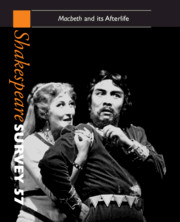Book contents
- Frontmatter
- Humane Statute and the Gentle Weal: Historical Reading and Historical Allegory
- Macbeth’s Knowledge
- ‘The Grace of Grace’ and Double-Talk in Macbeth
- Remind Me: How Many Children Had Lady Macbeth?
- Taking Macbeth out of Himself: Davenant, Garrick, Schiller and Verdi
- ‘Two truths are told’: Afterlives and Histories of Macbeths
- Doing All That Becomes a Man: The Reception and Afterlife of the Macbeth Actor, 1744–1889
- Macbeth and Kierkegaard
- Monsieur Macbeth: from Jarry to Ionesco
- The Politics of Sleepwalking: American Lady Macbeths
- Macbird! and Macbeth: Topicality and Imitation in Barbara Garson’s Satirical Pastiche
- Mick Jagger Macbeth
- ‘The Zulu Macbeth’: The Value of an ‘African Shakespeare’
- ‘A Drum, a Drum – Macbeth doth come’: When Birnam Wood moved to China
- The Banquet of Scotland (PA)
- Scoff power in Love’s Labour’s Lost and the Inns of Court: Language in Context
- Mercury, Boy Yet and the ‘Harsh’ Words of Love’s Labour’s Lost
- Shakespeare, Sir Thomas More and Asylum Seekers
- Hal as Self-Styled Redeemer: The Harrowing of Hell and Henry IV Part 1
- Mr Hamlet of Broadway
- Shakespeare Performances in England, 2003
- Professional Shakespeare Productions in the British Isles January–December 2002
- The Year's Contributions to Shakespearian Study 1 Critical Studies
- 2 Shakespeare in Performance
- 3 Editions and Textual Studies
- Books Received
- Index
Shakespeare Performances in England, 2003
Published online by Cambridge University Press: 28 March 2007
- Frontmatter
- Humane Statute and the Gentle Weal: Historical Reading and Historical Allegory
- Macbeth’s Knowledge
- ‘The Grace of Grace’ and Double-Talk in Macbeth
- Remind Me: How Many Children Had Lady Macbeth?
- Taking Macbeth out of Himself: Davenant, Garrick, Schiller and Verdi
- ‘Two truths are told’: Afterlives and Histories of Macbeths
- Doing All That Becomes a Man: The Reception and Afterlife of the Macbeth Actor, 1744–1889
- Macbeth and Kierkegaard
- Monsieur Macbeth: from Jarry to Ionesco
- The Politics of Sleepwalking: American Lady Macbeths
- Macbird! and Macbeth: Topicality and Imitation in Barbara Garson’s Satirical Pastiche
- Mick Jagger Macbeth
- ‘The Zulu Macbeth’: The Value of an ‘African Shakespeare’
- ‘A Drum, a Drum – Macbeth doth come’: When Birnam Wood moved to China
- The Banquet of Scotland (PA)
- Scoff power in Love’s Labour’s Lost and the Inns of Court: Language in Context
- Mercury, Boy Yet and the ‘Harsh’ Words of Love’s Labour’s Lost
- Shakespeare, Sir Thomas More and Asylum Seekers
- Hal as Self-Styled Redeemer: The Harrowing of Hell and Henry IV Part 1
- Mr Hamlet of Broadway
- Shakespeare Performances in England, 2003
- Professional Shakespeare Productions in the British Isles January–December 2002
- The Year's Contributions to Shakespearian Study 1 Critical Studies
- 2 Shakespeare in Performance
- 3 Editions and Textual Studies
- Books Received
- Index
Summary
If Shakespeare were still alive to collect performance fees, 2003 would have been a lucrative year for the Bard, with some thirty revivals of his plays staged by major professional companies in England alone: unless, that is, a large part of the plays’ continuing appeal to the cash-strapped theatres of this country lies in the fact that they are safely out of copyright. Had Shakespeare been a current paid-up member of the Authors’ Licensing and Collecting Society in 2003, for example, it is quite possible that the Royal Shakespeare Company would have avoided his work altogether. With budgetary shortfalls for once restraining the exuberance even of their designers (except Colin Peters, of whose adventures with As You Like It more later), and with the company’s management still in the uncertain interregnum between Adrian Noble’s Project Fleet (see Survey 55 and 56), and the full assumption of the Artistic Directorship by his successor Michael Boyd, the RSC announced only towards the end of 2003 that it would be performing new plays again (for the first time since 2001) late in the 2004 season. Despite reports in the summer that negotiations towards the establishment of a new London home for the company were on the verge of a successful outcome, and despite the news that the company’s forthcoming Swan productions of All’s Well That Ends Well and Othello would each transfer briefly to the Gielgud in spring 2004, only two RSC shows from its summer 2003 repertory, Gregory Doran’s interlinked revivals of The Taming of the Shrew and Fletcher’s The Woman’s Prize; or, The Tamer Tamed will be transferring to London (for a short run at the Queen’s in early spring 2004). The bulk of the company’s 2003 repertoire closed at the end of its late autumn run in Newcastle, never reaching metropolitan audiences at all.
- Type
- Chapter
- Information
- Shakespeare SurveyAn Annual Survey of Shakespeare Studies and Production, pp. 258 - 289Publisher: Cambridge University PressPrint publication year: 2004
- 3
- Cited by

